
Keyword research is a pillar of success in the bustling realm of digital marketing and content creation. Mastering the art of keyword research is essential for digital marketers, content creators, and SEO beginners. This guide will walk you through the intricacies of keyword research, highlighting its significance in SEO and providing you with actionable strategies to harness its power. By the end of this post, you’ll clearly understand how to conduct keyword research that drives traffic, enhances visibility, and elevates your online presence.

Keyword research is the process of identifying and analyzing search terms that users enter into search engines. It is a fundamental component of SEO because it helps marketers understand what their target audience is searching for. Identifying these keywords allows you to tailor your content to meet your audience’s needs better.
Keywords bridge what people are searching for and the content you provide to fill that need. By understanding the specific language and terms your potential customers use, you can optimize your content to align with their searches and increase your chances of ranking higher in search engine results pages (SERPs).
Keyword research isn’t just about finding keywords; it’s about discovering the right ones. The right keywords are those that are not only relevant to your business but also have the potential to attract significant traffic and conversions.
In the SEO world, keyword research is crucial because it informs every other SEO-related task you perform, including finding content topics, on-page SEO, and promotion. Without it, you’re shooting in the dark, hoping to hit something worthwhile.
Proper keyword research enables you to create content that resonates with your audience, thus driving more traffic to your site. When your content is tailored to what people are actively searching for, it naturally attracts more visitors, leading to higher engagement and conversion rates.
Additionally, keyword research helps you understand the competitive landscape. By analyzing what keywords your competitors are targeting, you can uncover gaps in their content strategy and identify opportunities to stand out in your niche.

When conducting keyword research, it’s essential to understand the difference between short-tail and long-tail keywords. Short-tail or head keywords are typically one to two words long and have high search volumes. Examples include “shoes” or “digital marketing.” While they can drive a lot of traffic, they are also highly competitive.
On the other hand, long-tail keywords consist of three or more words and are more specific. For instance, “comfortable running shoes for women” or “digital marketing tips for beginners.” Although they have lower search volumes, they often attract more qualified leads because they cater to more specific search queries.
Long-tail keywords are precious for targeting niche audiences and capturing intent-driven searches. They are less competitive and more targeted, making them essential for driving relevant traffic to your site.
Differentiating between commercial and informational keywords is another critical aspect of keyword research. Commercial keywords indicate a user’s intent to purchase or engage in a commercial action. Examples include “buy running shoes online” or “best digital marketing tools.”
Informational keywords, on the other hand, are used by individuals seeking information or answers to questions. Examples include “how to tie running shoes” or “what is digital marketing.” These keywords are ideal for creating content that educates your audience and establishes your expertise.
Understanding the intent behind these keywords allows you to create content that aligns with your audience’s needs and desires, ultimately guiding them through the buyer’s journey.

Before you begin your keyword research, clearly define your goals. What are you trying to achieve with your content? Are you looking to increase brand awareness, drive traffic, generate leads, or boost sales? Clarifying your objectives will help you focus your keyword research efforts and ensure your chosen keywords align with your business goals.
Defining your goals also involves understanding your target audience. Who are you trying to reach, and what are their needs and preferences? By putting yourself in your audience’s shoes, you can identify keywords that resonate with them and address their pain points.
Clear goals and a well-defined audience will guide your keyword research process and ensure you create content that meets your audience’s needs.
Once you have defined your goals, the next step is to generate a list of potential keywords. Start by brainstorming words and phrases related to your industry, products, or services. Consider what your ideal customers might type into a search engine when looking for information or solutions about your business.
You can also use keyword research tools to expand your list of keywords. These tools provide valuable insights into search volume, competition, and related keywords. Some popular keyword research tools include Google’s Keyword Planner, SEMrush, and Ahrefs. Remember to include variations of your main keywords and consider short and long-tail options.
Generating a broad list of keywords will give you a solid foundation for further analysis and refinement.
With your list of potential keywords, it’s time to analyze their metrics. Consider critical factors such as search volume, competition, and relevance. Search volume indicates how often a keyword is searched, while competition shows how difficult it is to rank for that keyword.
Ideally, you want to target keywords with a healthy search volume and competition balance. High search volume suggests that a keyword has the potential to drive significant traffic, while lower competition makes it easier to rank higher in search results.
Relevance is also crucial. Ensure that the keywords you choose align with your content and business objectives. Even if a keyword has a high search volume, it will only be valuable if it attracts the right audience.
After analyzing the metrics, refine your list of keywords to focus on the most promising options. Consider the keywords that align with your goals, have a reasonable search volume, manageable competition, and are vitally relevant to your content.
The goal is to create a prioritized list of keywords to guide your content creation. Remember that it’s not about quantity; it’s about quality. A smaller list of well-researched and strategically selected keywords will be more effective than a lengthy list of irrelevant terms.
Refining your selection will ensure that your content is optimized for the right keywords, increasing your chances of successfully reaching your target audience.

Keyword research tools are crucial in discovering valuable keywords and gaining insights into their performance. When choosing a tool, you’ll encounter both free and paid options. Free tools like Google’s Keyword Planner and Ubersuggest offer basic functionality, making them a great starting point for beginners.
Paid tools such as SEMrush, Ahrefs, and Moz provide advanced features and comprehensive data, allowing for more in-depth analysis. They offer valuable insights into keyword metrics, competitor analysis, and search trends, making them valuable assets for more experienced marketers.
When deciding between free and paid tools, consider your budget, needs, and experience level. Both options can be effective when used strategically.
Several keyword research tools have gained popularity among digital marketers and SEO experts. Google’s Keyword Planner is widely used due to its integration with Google Ads and its ability to provide keyword suggestions based on your niche and target audience.
SEMrush is another powerful tool that offers a wide range of features, including keyword research, competitor analysis, and site audits. It provides detailed information on keyword difficulty, search volume, and trends, helping you make informed decisions.
Ahrefs is known for its comprehensive backlink analysis and keyword research capabilities. It allows you to explore keyword ideas, analyze competition, and identify content gaps to improve your SEO strategy.
These tools, among others, can significantly enhance your keyword research process and provide valuable insights into your target audience’s search behavior.
Competitor analysis is an advanced keyword research technique that examines your competitors’ websites and identifies their target keywords. By analyzing their content and SEO strategies, you can uncover valuable insights and discover opportunities to outperform them.
Start by identifying your main competitors and exploring their websites. Look at the keywords they use in their content, meta tags, and headings. Tools like SEMrush and Ahrefs can help you gain insights into their top-performing keywords and content.
By understanding your competitors’ strategies, you can identify gaps in their content and find unique angles to differentiate your brand. This approach allows you to stay ahead of the competition and attract a larger share of your target audience.
Keyword mapping is a strategic process that involves assigning specific keywords to individual pages or content on your website. It ensures that each page is optimized for a particular keyword, preventing keyword cannibalization and improving your site’s overall SEO performance.
Begin by creating a site map and identifying the primary pages you want to optimize. Assign relevant keywords to each page based on their content and purpose. Make sure the keywords align with the page’s topic and user intent.
A well-executed keyword mapping strategy helps organize your content. It ensures that your website is optimized for a diverse range of relevant keywords, enhancing your chances of ranking higher in search results.

The digital landscape is constantly evolving, and search trends can change rapidly. Staying updated with these trends is essential for effective keyword research. Monitor industry news, follow SEO blogs, and use tools like Google Trends to identify emerging topics and search patterns.
You can adapt your keyword strategy to align with current trends and capitalize on new opportunities by staying informed. This proactive approach allows you to create timely and relevant content that resonates with your audience.
Regularly revisiting your keyword research and updating your content ensures that your SEO strategy remains dynamic and effective in a constantly changing environment.
Keyword research is not a one-time task but an ongoing process. Regularly monitor the performance of your chosen keywords and assess their impact on your website’s traffic and rankings. Use analytics tools to track click-through rates, bounce rates, and conversions.
If a keyword is performing well, consider creating more content around it. If a keyword isn’t delivering the desired results, reevaluate its relevance and consider adjusting your strategy.
Adaptability is critical to maintaining a successful SEO strategy. Continuously monitoring and refining your keyword research ensures your content stays relevant and competitive.
In digital marketing and SEO, keyword research is a fundamental process that can make or break your online success. By understanding the principles of keyword research and implementing effective strategies, you can unlock the potential to drive targeted traffic, improve search rankings, and connect with your audience on a deeper level.
Remember that keyword research is an evolving practice. Stay curious, stay informed, and continue to adapt to the changing landscape of search trends. With dedication and a strategic approach, you’ll be well on your way to SEO success.
Start applying these techniques today, and watch your online presence grow. If you found this guide helpful, please share it with your network and leave feedback. Together, we can elevate the world of SEO and digital marketing!